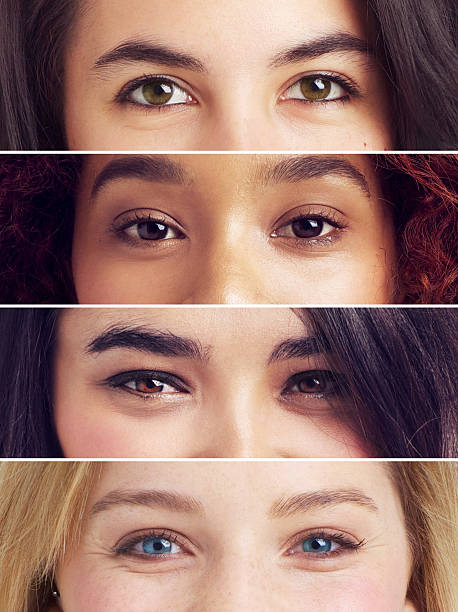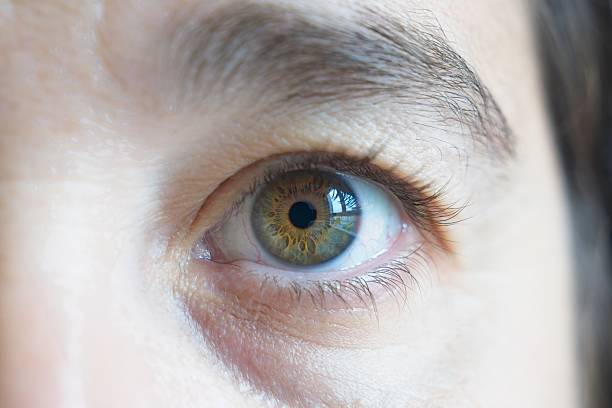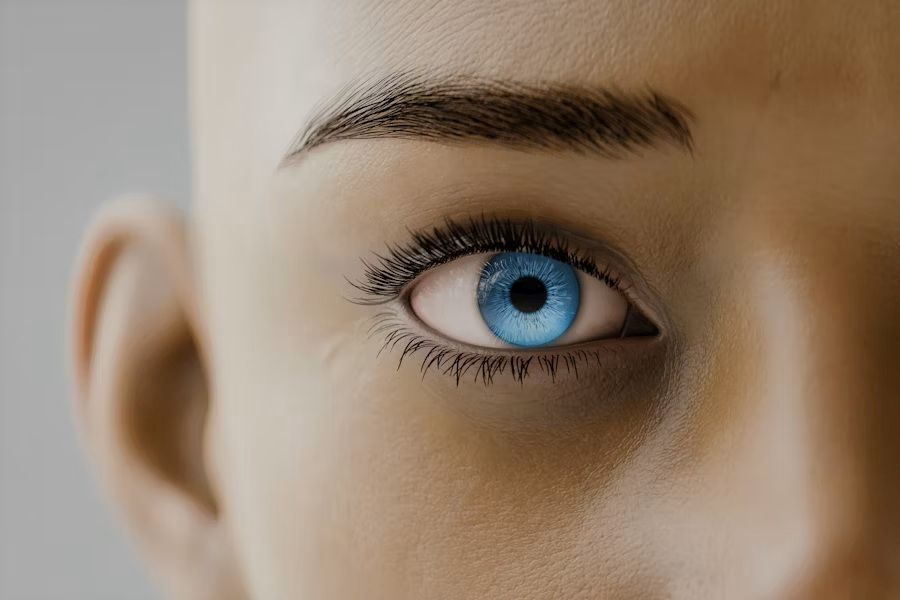Your Cart is Empty
Eye Color and Personality: Debunking the Myths and Exploring the Science

For centuries, humans have been fascinated by the varied hues of the human eye. From the piercing blue eyes of Paul Newman to the mesmerizing green gaze of Elizabeth Taylor, eye color has long been associated with beauty, mystery, and even personality traits. But is there any truth to the idea that your eye color can reveal aspects of your character? Let's dive into the myths, the science, and the surprising truths about the connection between eye color and personality.
The Colorful World of Eye Myths
Before we explore the scientific perspective, let's examine some of the most popular beliefs about eye color and personality:
1. Blue Eyes: Often associated with innocence, shyness, and a gentle nature. Some believe blue-eyed individuals are more sensitive to pain.
2. Brown Eyes: Typically linked to trustworthiness, confidence, and a strong-willed personality.
3. Green Eyes: Often considered mysterious, creative, and passionate. Some cultures view green eyes as a sign of jealousy or unpredictability.
4. Hazel Eyes: Associated with adventurousness, courage, and a fun-loving nature.
5. Gray Eyes: Often linked to wisdom, gentleness, and a balanced personality.
These associations have permeated popular culture, literature, and even some pseudoscientific fields. But how much truth is there to these claims?
The Science Behind Eye Color
To understand the relationship (or lack thereof) between eye color and personality, we first need to understand the biology of eye color.
Eye color is determined by the amount and type of pigments in the iris, the colored part of the eye. The primary pigment involved is melanin, the same compound responsible for skin and hair color. The two forms of melanin found in the iris are:
1. Eumelanin: Responsible for brown to black pigmentation
2. Pheomelanin: Responsible for red to pink pigmentation
The amount and proportion of these pigments, combined with how light scatters in the iris, determine the visible eye color. Blue eyes, for instance, aren't actually blue – they appear blue due to the way light scatters in the iris, similar to why the sky appears blue.
Dr. Emma Richardson, a geneticist specializing in eye color, explains, "Eye color is primarily determined by genetics. Multiple genes are involved, with OCA2 and HERC2 playing significant roles. However, the genetics of eye color are complex, and we're still discovering new contributing factors."
Debunking the Myths: What Science Says
When it comes to linking eye color to personality traits, scientific research paints a very different picture from popular beliefs:
1. No Direct Correlation: Numerous studies have failed to find any significant, direct correlation between eye color and personality traits. The idea that eye color can predict character is not supported by scientific evidence.
2. Genetic Complexity: Both eye color and personality are influenced by multiple genes and environmental factors. The genes responsible for eye color are not known to influence personality traits directly.
3. Cultural Influence: Many associations between eye color and personality are likely cultural constructs, varying across different societies and time periods.
4. Confirmation Bias: People tend to notice and remember instances that confirm their pre-existing beliefs, leading to the perpetuation of eye color myths.
Dr. Sarah Thompson, a psychologist specializing in personality research, states, "While it's tempting to draw connections between visible traits like eye color and personality, the scientific evidence simply doesn't support these claims. Personality is far too complex to be determined by a single physical characteristic."
The Reality of Eye Color Research
While eye color doesn't directly influence personality, some interesting correlations have been observed in scientific studies:
1. Pain Tolerance: A 2014 study suggested that women with light-colored eyes may have a higher tolerance for pain and discomfort during childbirth compared to women with dark eyes. However, this study has been criticized for its small sample size and potential confounding factors.
2. Alcohol Consumption: A 2001 study found a potential link between eye color and alcohol consumption, with individuals with light eyes drinking slightly more on average. However, the researchers emphasized that the connection was weak and likely influenced by various factors.
3. Trustworthiness Perception: A 2013 study found that people with brown eyes were perceived as more trustworthy than those with blue eyes. Interestingly, when researchers used photo editing to change the eye color of the subjects, the perception remained tied to facial structure rather than eye color itself.
4. Reaction Time: Some studies have suggested that people with darker eyes may have slightly faster reaction times in certain tasks. However, these differences are minimal and don't translate to significant real-world advantages.
It's crucial to note that these studies often have limitations, such as small sample sizes or potential cultural biases. They also typically show correlations rather than causation, meaning other factors could be influencing the results.
The Rise of Iris Photography: A New Perspective on Eye Color
Interestingly, as science continues to demystify eye color, a new trend is emerging that celebrates the unique beauty of each person's eyes. With the advancement of smartphone camera technology, many people are now capturing high-resolution images of their own irises, a practice often referred to as "eye selfies" or "iris portraits."
John Davies, a digital artist specializing in eye photography, explains, "Each iris is like a fingerprint – utterly unique. With today's phone cameras, people can capture incredibly detailed images of their eyes, revealing patterns and colors they've never noticed before. It's not about personality traits; it's about appreciating the intricate beauty of the human eye."
This trend has gained popularity on social media platforms, with users sharing close-up shots of their eyes and marveling at the complex patterns and color variations within their irises. While not scientifically significant, this phenomenon underscores our continued fascination with eye color and the human desire to find meaning in our unique physical traits.
The Psychology Behind Eye Color Beliefs
If science doesn't support a link between eye color and personality, why do these beliefs persist? Several psychological factors come into play:
1. Pattern Recognition: Humans are wired to seek patterns and explanations, sometimes leading us to see connections where none exist.
2. Cultural Reinforcement: Movies, literature, and cultural traditions often perpetuate ideas about eye color and personality, reinforcing these beliefs.
3. Self-Fulfilling Prophecy: People who believe in eye color stereotypes might unconsciously act in ways that confirm these beliefs, both in themselves and others.
4. Aesthetic Preferences: Positive or negative associations with certain eye colors can influence how we perceive individuals with those eye colors.
Dr. Michael Lee, a social psychologist, notes, "The persistence of eye color myths speaks to our desire for simple explanations in a complex world. It's much easier to attribute personality traits to a visible characteristic like eye color than to acknowledge the multifaceted nature of human personality."
The Impact of Eye Color Beliefs
While eye color myths might seem harmless, they can have real-world consequences:
1. Bias in Personal Interactions: Preconceived notions about eye color could influence how we interact with others, potentially leading to unfair judgments or treatment.
2. Self-Perception: Individuals might limit themselves or alter their behavior based on beliefs about what their eye color "means."
3. Marketing and Media: Eye color stereotypes are often used in advertising and entertainment, perpetuating these myths and potentially influencing consumer behavior.
4. Pseudoscientific Practices: Some alternative medicine practices incorporate eye color into diagnoses or treatments, potentially leading people away from evidence-based healthcare.
Embracing the True Significance of Eye Color
While eye color may not be a window to personality, it remains a fascinating aspect of human diversity. Here are some scientifically supported facts about eye color that are truly worth appreciating:
1. Genetic Marvel: The intricate genetics behind eye color showcase the complexity of human biology.
2. Evolutionary History: The variation in human eye color tells a story of our species' migration and adaptation to different environments.
3. Medical Insights: Changes in eye color can sometimes indicate health conditions, making it a valuable diagnostic tool in medicine.
4. Unique Identifier: Like fingerprints, the patterns in the iris are unique to each individual, leading to applications in biometric identification.
Conclusion: Seeing Eye Color in a New Light
As we've explored, the popular beliefs linking eye color to personality traits are not supported by scientific evidence. Eye color, determined by complex genetic factors, does not directly influence or predict an individual's character or abilities.
However, this debunking of myths doesn't make eye color any less fascinating. From the intricate genetics that create the vast array of human eye colors to the unique patterns visible in each iris, our eyes remain a source of wonder and beauty.
As we move forward, it's important to appreciate eye color for what it truly is – a beautiful example of human diversity and a testament to the complexity of our genetic makeup. Rather than trying to divine personality traits from iris hues, we can marvel at the science behind eye color and the unique story each person's eyes tell.
In a world that often seeks simple explanations for complex phenomena, the truth about eye color and personality reminds us to look beyond surface-level characteristics. It encourages us to appreciate the depth and complexity of human nature, which is far too intricate to be captured by a single physical trait.
So the next time you gaze into someone's eyes, instead of wondering what their color might say about their personality, take a moment to appreciate the unique beauty and complexity you see. After all, the most important thing our eyes reveal is not our character, but our shared humanity – a truth far more profound than any myth about eye color could ever be.
1 Response
Leave a comment
Comments will be approved before showing up.





Jess
July 25, 2025
It was never said that blue eyes are the reason why they behave the way they do. It was coming from more of a psychological standpoint. Are people with blue eyes and dark hair treated differently and that’s why many (not all) act insincere and mean spirited.